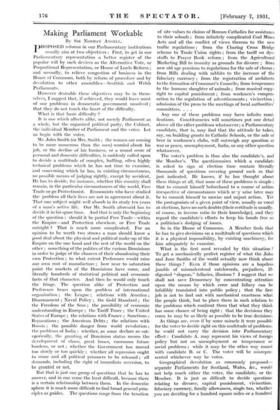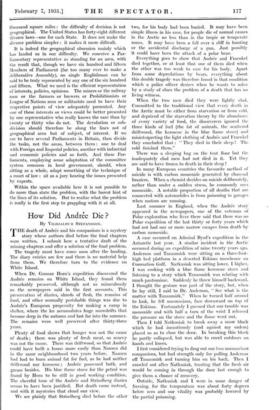Making Parliament Workable
By SIR NORMAN ANGELL.
pROPOSED reforms in our Parliamentary institutions usually aim at two objectives : First, to get in our Parliamentary representation a better register of the popular will by such devices as the Alternative Vote, or Proportional Representation, or House of Lords Reform ; and secondly, to relieve congestion of business in the House of Commons, both by reform of procedure and by devolution to other assemblies—Scottish and Welsh Parliaments.
However desirable these objectives may be in them- selves, I suggest that, if achieved, they would leave most of our problems in democratic government unsolved ; that they do not touch the heart of the difficulty.
What is that basic difficulty ?
It is one which affects alike, not merely Parliament as a whole, but the organized political party, the Cabinet, the individual Member of Parliament and the voter. Let us begin with the voter.
Mr. John Smith (or Mrs. Smith ; the women are coming to he more numerous than the men) worried about his job, or the decline of his business, or a round score of personal and domestic difficulties, is suddenly called upon to decide a multitude of complex, baffling, often highly technical problems which he has not time to examine, and concerning which he has, in existing circumstances, no possible means of judging rightly, except by accident. He has to decide, for instance, whether this country shall remain, in the particular circumstances of the world, Free Trade or go Protectionist. Economists who have studied the problem all their lives are not in agreement about it. That one subject might well absorb in its study ten years of a man's active life. Our Mr. Smith aforesaid has to decide it in his spare time. And that is only the beginning of the question : should it be partial Free Trade—within the Empire—and Protection elsewhere, or Free Trade outright ? That is much more complicated. For an opinion to be worth two straws a man should know a good deal about the physical and political make-up of the Empire on the one hand and the rest of the world on the other ; something of the politics of the various Dominions in order to jndge of the chances of their abandoning their own Protection ; to what extent Preference would raise our own cost of manufacture ; how near to saturation point the markets of the Dominions have come, and literally hundreds of statistical political and economic facts of that character. And then he would only touch the fringe. The question alike of Protection and Preference bears upon the problem of international organization ; the League ; relations with America ; Disarmament ; Naval Policy ; the Gold Standard ; the the Freedom of the Seas ; the possibility of economic understanding in Europe ; the Tariff Truce ; the United States of Europe ; the relations with France ; Sanctions ; Reparations ; the American Debts ; the relations with Russia ; the possible danger from world revolution ; the problems of India : whether, as some declare so cat- egorically, the granting of Dominion status means the development of chaos, great losses, enormous future burdens, or not ; whether the Government has moved too slowly or too quickly ; whether all repression ought to cease and all political prisoners to be released ; - all demands, including the right of immediate secession, to be granted or not.
But that is just one group of questions that he has to answer, and in one sense the least difficult, because there is a certain relationship between them. In the domestic sphere it is much more difficult to find broad general prin- ciples as guides. The questions range from the taxation of site values to claims of Roman Catholics for assistance to their schools ; from infinitely complicated Coal Mines Acts and all the conflict of views thereon to the new traffic regulations ; from the Charing Cross Bridge scheme to Trade Union rights ; from the tariff on dye- stuffs to Prayer Book reform ; from the Agricultural Marketing Bill to insanity as grounds for divorce ; from new old age pensions to regulations for the sale of cheese ; from Bills dealing with rabbits to the increase of the fiduciary currency ; from the registration of architects to the formation of Consumer's Councils; from temperance to the humane slaughter of animals ; from musical copy- right to capital punishment ; from workmen's compen- sation to the regulation of advertisements ; vivisection ; admission of the press to the meetings of local authorities' committees. . . .
Any one of these problems may have infinite rami- fications. Constituencies will sometimes put one detail above all the other problems whatsoever; a Parliamentary candidate, that is, may find that the attitude he takes, say, on building grants to Catholic Schools, or the sale of beer in workmen's clubs, will outweigh any question of war or peace, unemployment, India, or any other question whatsoever.
The voter's problem is thus also the candidate's, and the Member's. The questionnaires which a candidate is asked to sign at election time contain literally thousands of questions covering ground such as that just indicated. He knows, if he has thought about these things at all, that none of these problems is simple ; that to commit himself beforehand to a course of action irrespective of circumstances which n?-.y arise later may be to commit himself to unwise and unjust action. Yet the protagonists of a given point of view, usually so vocal at elections, have no such doubts (their certitude is usually, of course, in inverse ratio to their knowledge), and they regard the candidate's efforts to keep his hands free as a politician's dodging of issues.
So in the House of Commons. A Member finds that he has to give decisions on a multitude of questions which it is a physical impossibility, by existing machinery, for .him adequately to examine.
What is the first need revealed by this situation ? To get a mechanically perfect register of what the John and Jane Smiths of the world actually now think about these things ? Even if those opinions are a hopeless jumble of misunderstood catchwords, prejudices, ill- digested "slogans," fallacies, illusions ? I suggest that we shall not save Democracy by concentrating attention upon the means by which error and fallacy can be infallibly translated into public policy ; that the first job is not to find out with mechanical exactness what the people think, but to place them in such relation to the problems which confront them that what they think has some chance of being right ; that the decisions they come to may be as likely as possible to be true decisions. As things are, even if by some miracle it were possible for the voter to decide right on this multitude of problems, he could not carry the decision into Parliamentary effect : Candidate A. may represent his views of foreign policy but not on unemployment or temperance or social problems ; while it may be the other way round with candidate B. or C. The voter will be misrepre- sented whichever way he votes.
Geographical devolution as commonly proposed—. separate Parliaments for Scotland, Wales, &c., would not help much either the voter, the ca. ndidate, or the Member. It is just as difficult to decide questions relating to divorce, capital punishment, vivisection, fiduciary currency, family allowances, single tax, whether you are deciding for a hundred square miles or a hundred thousand square miles : the difficulty of decision is not geographical. The United States has forty-eight different divorce laws—one for each State. It does not make the divorce problem simpler : it makes it more difficult.
It is indeed the geographical obsession mainly which has landed us in our difficulty. We conceive a Par- liamentary representative as standing for an area, with the result that, though we have six hundred and fifteen Members of Parliament (far too many ever to make a deliberative Assembly), no single Englishman can be said to be truly represented by any one of the six hundred and fifteen. What we need is the efficient representation of interests, policies, opinions. The miners or the railway men or the farmers or brewers or Prohibitionists or League of Nations men or militarists need to have their respective points of view adequately presented. Any one of these interests or views could be better presented by one representative who really knows the case than by twenty or thirty who do not. The devolution or sub- division should therefore be along the lines not of geographical area but of subject, of interest. If we are to have several Parliaments in Britain, then divide the tasks, not the areas, between them : one to deal with Foreign and Imperial policies, another with industrial and economic policies and so forth. And these Par- liaments, employing some adaptation of the committee system common in local government, should, when sitting as a whole, adapt something of the technique of a court of law : sit as a jury hearing the issues presented by experts.
Within the space available here it is not possible to do more than state the problem, with the barest hint of the lines of its solution. But to realize what the problem is really is the first step to grappling with it at all.











































 Previous page
Previous page